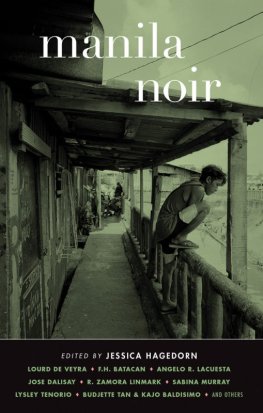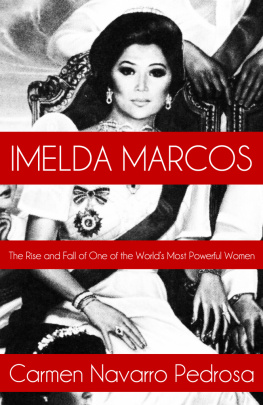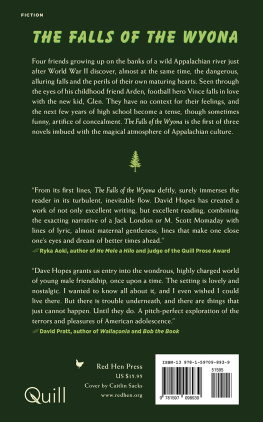ALSO BY GINA APOSTOL
Bibliolepsy
The Revolution According to
Raymundo Mata
Gun
Dealers
Daughter
A NOVEL

GINA APOSTOL
W. W. NORTON & COMPANY
NEW YORK LONDON
FOR ARNE
CONTENTS
Part I

U NCLE GIANNI MET the girl at Nice Airport. He held her by the hand as lightbulbs flashed. Revise that: not hand. By the sleeve. He held me by the sleeve, gently. There was something awkward about my arrival.
My stooped, discordant figuremy bandaged, gauzed lump of hands.
A cordon held curious onlookers at bay, and a film crew, Gallic and impervious, skinny, tilting men in black, strode about my cleared path. I moved along the cleared-up space of an orchestrated welcome, following the straight line of a utility rope. I stumbled. I kicked the shin of a blond gaffer on bent knee, a gofer pulling tape from the floor. A commercial, Uncle Gianni muttered. I shivered as a door blew open. A lightbulb blinded me. I felt someone rushing behind mea lady walking a dog? A cripple with a parasol. My suddenly myopic eyes distinguished a lame mans fleshy elbows, or was it a leash? Uncle Gianni tightened his grip and, almost dragging me by an armpit, moved me quickly along.
And in a cutting room somewhere, freeze-framed, on the margins of that black-clad crowd posing to sell condoms or perfume, a girls stricken facemy gazelooks down, denying evidence of its arrival, gaunt-cheeked and hollow-eyed.
N O QUESTIONS ASKED , no thoughts pursued. The days in a winter town, in the south of France, were a blur of boats. Medicated recall. My bandaged hands held me back, a drugged drag. I watched the gauze on my wrists fray, a gray, wispy itch.
By the look of our lodgings, it had not been planned: the place was not worthy of Uncle Gianni. Uncovered beams, rough wood. This cramped place by the water in a narrow street overlooking a threaded sea was, I thought, pretty. But Uncle Gianni raised an eyebrow at its crude renovation. The room was whitewashed: brown timber framed the paint. Sometimes, the white walls seemed to reflect the silver sea, its glints, its undulating glare. You could see the boats from a window, cutouts in a livid blue.
Uncle Gianni ordered lunch at the square, near the carousel. I gave the man the merry-go-round ticket, a neon-colored heart, and rode the horse, a slow reverie of motion. Up the rue du Haut Castelet, a writer had pursued a novel in exile, and now it contained a memory of his name, hidden in bougainvillea. A one-eyed dog, its absurd body stunted by heedless breeding, shat on the cobbles as its patient owner watched, while the French diners drank their anise, and I wished to retch.
I watched the angled play of masts, the modest geometries of massive hulls waiting for domestic ghosts. Winter boats moored for pleasure. Wrinkled caretakers appeared amidship, smoking joints and dragging rope. I noted names and origins, boats from Guernsey and Oporto. None of the names struck my fancy, though one was a namesake: blue and sunless Sol, a gloomy sloop, dingy dinghy. Unappetizing clothesdenims, a hat, underwearflapped, drying, on her deck.
When Uncle Gianni learned from one of the caretakers, a youngish sailor with receding hair, that I wished to know, in broken French, how my services could be of use, laundering or scrubbing, not for pay, just for board, once the yacht left the marina, Uncle Gianni took me away. First we had that scene, the drama on the jetty.
U NCLE GIANNI HAD been walking along the stones, the lank seaweeds, and there I walked beyond him. He couldnt see; he was looking at the horizon, at the green, jutting rocks. I walked until I reached the end. And in a muddled moveI made this leap. A deep, chilling immersion.
I tried to sink in the Mediterranean, which was hard to do.
I am no Ophelia.
Im a floater.
It was my second escape.
I had tried it in Manila. With broad, stupid knives. Big, messy gashes, a knotted misery in my wrists. Hullaballoo in the hallway. It was the maids who saved me, a stampede from the kitchen. Hard to die in a house of servants. All I have to show for my remorse, my dead feelingsthis shallow well of scars.
I tried to sink.
But the calm ice waters of the Mediterranean buoyed me up, as if I were light-born. The sea kept lifting me toward the light. The chilly waves gently lofted me.
And then I froze.
I panicked. Awash in that chilly, wide, engulfing sea, I felt myself sinking. The ice-waves rolled over me, a heavy rush thrusting me underwater. My legs locked, my limbs froze. I couldnt move.
Once more the sea rolled over me.
I wished to live.
I struggled. I gasped for air. As I did, I saw my final images: a green-veined hand, a rock in the distance, a stern, unforgettable sky. I saw two goons in starched blue Makati security guard uniforms, smiling and interrogating me, one holding a stuffed animal, Ali Babar? Ali Babar? Then they were holding on to my shins, dragging me down. In incoherent, sputtering flashes.
Brown-dotted seashells, like turtles backs. Scuttling across the floors of silent seas. An infinite array of books.
Jed holding a banner, a look in his eye that was not comfort or appeasement. A strange absent tendernessa hand against barnacled rock.
A wave spun me. I reached for the rock. Visions rolled as I met the sky. Rain, sleet and snow, heavy, fat and diabolical. The weight of sand and rocks and that volumed, fickle water, and I sank, losing ground, losing the features of my dull face; the pull of my heavy, tenacious hair; and Manong Babe, his belly slack and his shoes shined, holding a baseball bat in my old garden, smiling at me while I drowned.
A STICK FIGURE ON the stones: Uncle Gianni. A quick splash. As he swam closer, he seemed to slow to an excruciating, meditative, languorous crawl, then to a towering grin as he held me, my thrashing legs against the rock, my floating, freezing tears.
O LIVE GROVES ARE medicinal. That was the verdict of the new places founders, who lined the path to the clinic with spare, gray-green trees, a view that was not optional. Stiff white sheets in an austere room, padded with those strange, sausage French pillows, uncomfortable and almost demeaning, as if I were not some human but a creature who thrashed against a cage. There was a crucifix on the whitewashed wall. That, too, was implacable: the corners of the cross were nailed fast, in anticipation of heretical moves. Trim French nurses guarded me, mild-faced orderlies with bronzed skins. In the chapel, Baroque music played from invisible speakers, and the haunting tones of a sourceless cantata convinced me momentarily of the presence of God. He was there in the screen. I cowered miserably before it. God spoke English with an accent. I didnt speak. I looked God wanly in the eye and didnt blink. My sobs echoed in the chapel, and God in hiding had nothing to say.
I planted tulip bulbs in a shady part of the garden, moving timidly with other patients, all of us passive and not meeting other eyes, afraid to be caught in each others company, wearing our white uniforms with blue sashes. As I knelt, I tucked the skirts folds through my knees in a perverse, modest way: as if the skirt were fastened in my crotch, in tune with ancient convent-bred women, Lola Felma, for instance, my grandmother frozen in childhood, squatting just so, folding her skirt between her thighs, so that her underwear did not peep through.
Vague things came back as I smoothed the earth, distant, trivial things: this same white and blue outfit, worn in Manila a long time ago (the uniform of Our Lady of Lourdes); a little girl with desperate eyes and sausage curls; a refrigerator magnet I once bought in Boston. The white poster of a headless woman. An orphan and a giant peach, maybe a guava. And then I thought of a body in the dirt, a head buried like this tulip, just so.
Next page









